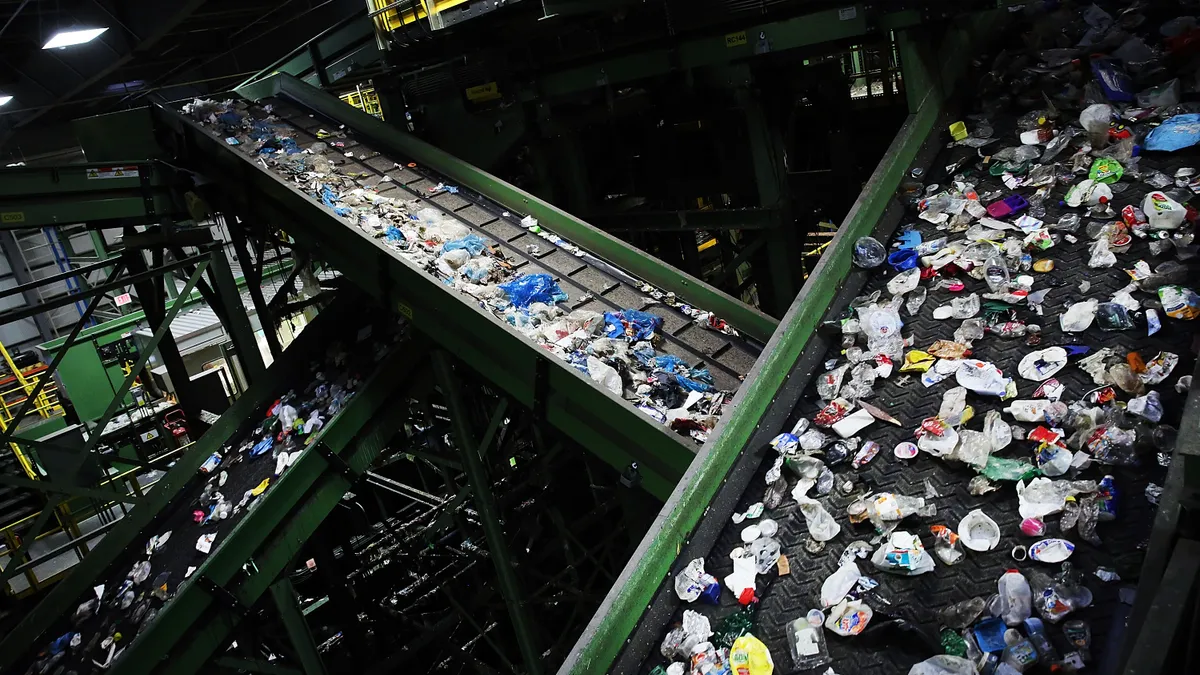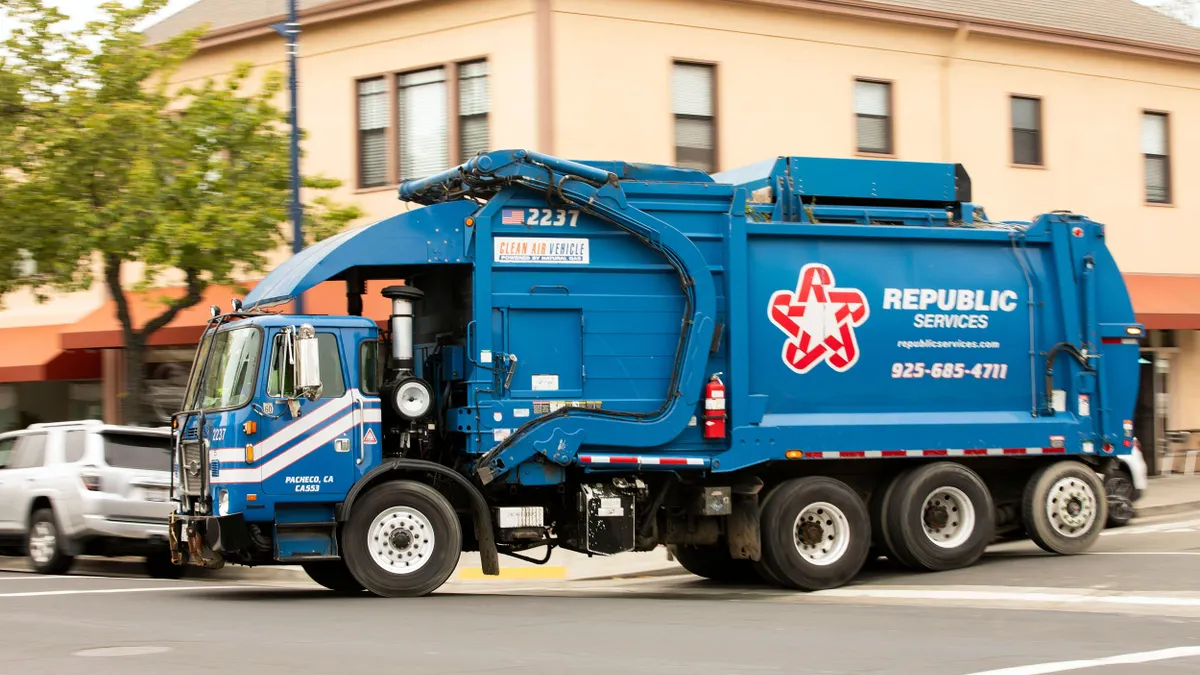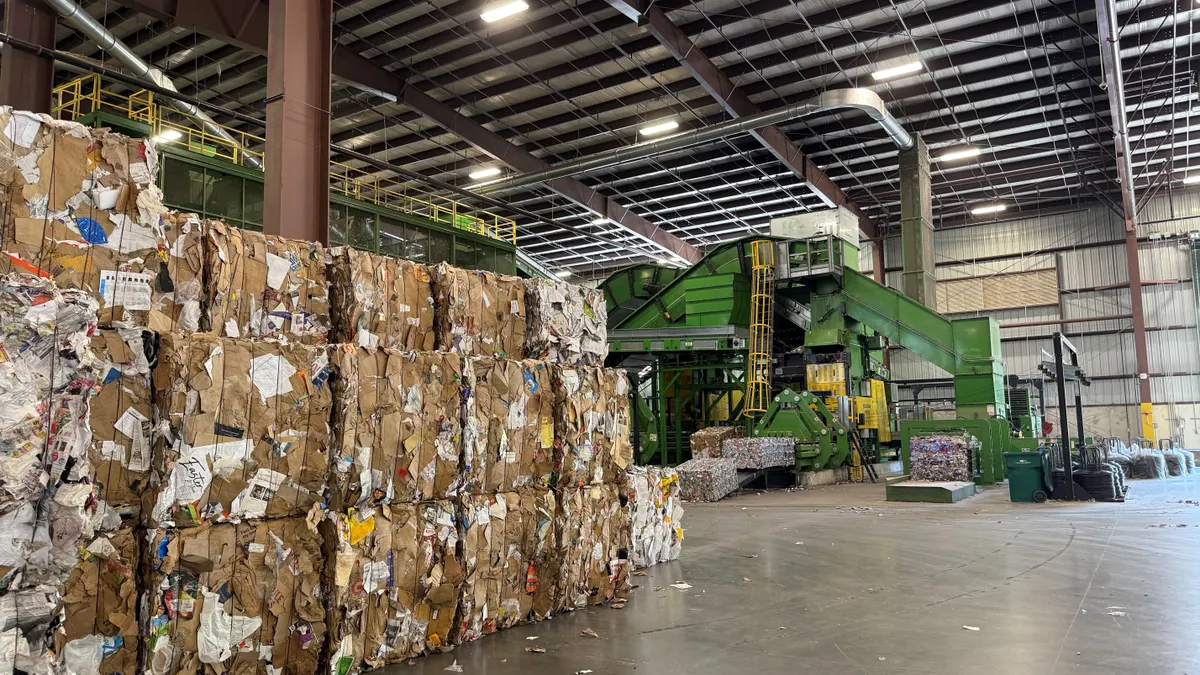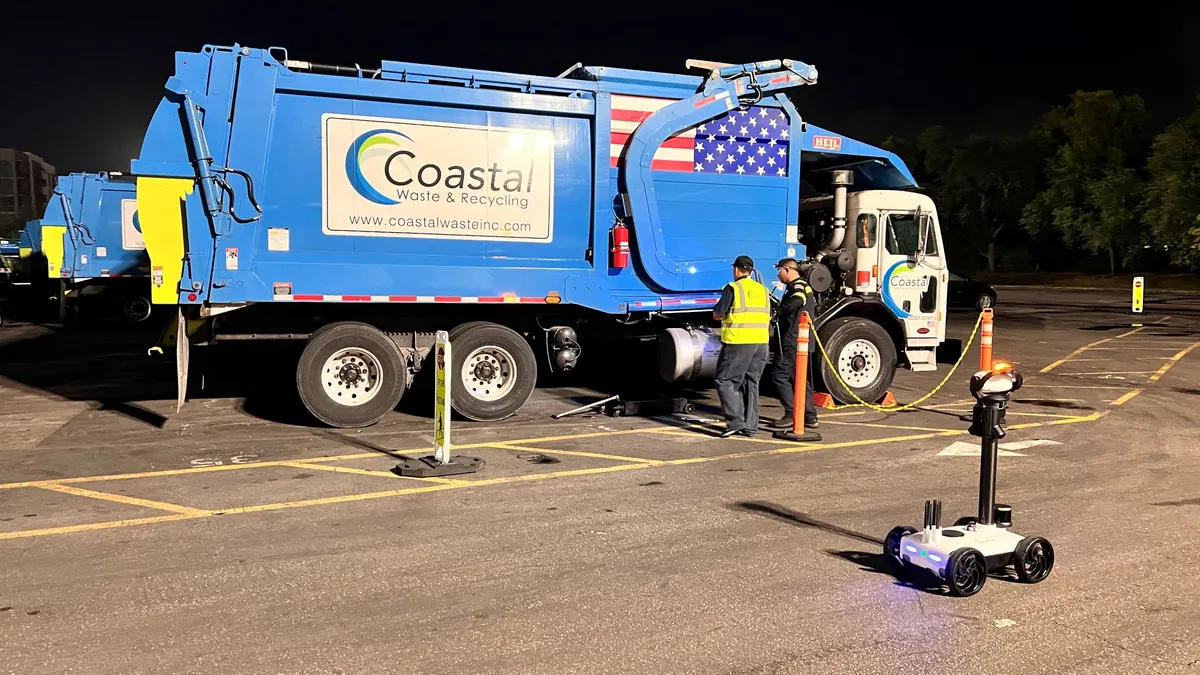As the waste and recycling industry makes a rapid pivot to life under the specter of coronavirus, MRFs are seeing some of the biggest operational changes.
New workplace guidelines have led to closures or limitations at processing facilities in multiple states — including Arkansas, California, Michigan, New York and South Carolina — but the majority of U.S. MRFs appear to still be running normally. Over the past week, Waste Dive spoke with operators ranging in size from one location to more than 100 and heard similar comments about how these facilities are adapting. While conditions are challenging, many also emphasized a feeling of obligation to keep going as a recognized essential service during the pandemic.
"The bale of cardboard you've made today could be providing medical supplies in a week or two," said Brent Bell, Waste Management's vice president of recycling, last Friday. "You’re getting these MRFs staffed probably better than we’ve seen in years."
Waste Management, Republic Services, Leadpoint and others reported taking aggressive steps to ensure employees stay home if they're showing symptoms, and reported limited to no confirmed cases at their MRFs to date. Common practices largely centered around frequent cleaning procedures for high-touch surfaces and adaptations to meet social distancing requirements. As recently reported by Resource Recycling, other companies including Casella Waste Systems, Sims Municipal Recycling, Mid-America Recycling and Dem-Con Companies have all taken similar steps.
Outside of changes to meeting and break policies, the distancing requirements have also affected staffing at many facilities. Depending on the configuration of a given sort line, employees are being asked to spread out until their arms can't touch, leave bunkers unmanned or, in some cases, work between physical barriers. In certain cases, this has also meant running lines more slowly or possibly accepting slightly higher residual rates on the back-end due to missed material.
Private sector operators reported obtaining appropriate personal protective equipment (PPE) hasn't yet been a significant challenge and MRF workers were already expected to be wearing gloves and safety glasses at a minimum. Opinions varied on the availability of masks or face coverings, with bandanas noted as a back-up option in one case.
Questions about the safety of hand sorting have also come up at some sites — raised by financial analysts and labor advocates alike — but the industry's largest companies pointed to trade association and federal guidance indicating it's not a high risk.
All of this comes as the waste stream is shifting significantly in many markets — more residential volume, less commercial — and the workforce is under greater stress. But most companies say they're still equipped to keep going, even with some absences due to illness or childcare issues, in part because job options are limited right now and attendance policies are more flexible.
"Our staffing levels are maintaining," Brian Haney, vice president of safety and compliance at work team company Leadpoint, said on Monday. "Working in the MRF isn't necessarily the most glamorous job, but the tons never stop coming. It’s a good business in a crisis and really outside of a crisis."
Pete Keller, Republic's vice president of recycling and sustainability, said last Friday that trend tracks across the company's MRF portfolio and no operations have stopped as a result of COVID-19.
"Folks are showing up, we’ve been able to run," he said. "Nobody knew where we were going to be a couple weeks ago, but we’re doing quite well."
COVID-19 challenges
MRFs may be keeping up overall, but the situation has still been turbulent and operations in some cases have been limited.
Waste Management temporarily suspended residential recycling operations at five California facilities, due in part to social distancing issues, and at least three other companies in the state have taken similar steps. New York-based Omni Recycling reportedly shut down its own facility due to multiple worker illnesses, according to a letter from the company sent to one local village.
Three facilities were recently closed in the Michigan counties of Emmet, Isabella and Kent. The decisions, which affected dozens of municipalities and additional counties, were not made lightly, according to county officials.
Emmet County first closed its MRF on March 14, following staffing shortages related to the virus. Andi Shepherd, director of the Department of Public Works and Recycling, said Emmet's transfer station, composting operation and some collection services were also temporarily affected. Following a deep cleaning, the MRF was able to resume partial processing by March 19 because it has a dual-stream system.
"Our paper line has a lot wider conveyor and the stations are spread out a lot further apart," said Shepherd, describing the facility's container line as too small for adequate distancing. Shepherd also mentioned a planned upgrade to extend the pre-sort line and add robotics as a future solution. "If we had our new line we would not have had to shut down the containers."
Operations on that line have resumed after workers created barriers: cardboard hung from the ceiling, zip tied together, and wrapped with thick plastic film that can be sprayed down with disinfectant.
Kent County shut down its MRF on March 27 due to what Department of Public Works Director Darwin Baas described as a variety of factors. With the county's work release program suspended, and turnover from a staffing agency as high as 40%, other county employees were being asked to jump on the line in the final days. Social distancing was another issue, as "workers are nearly elbow to elbow in different locations of the plant."
Concerns about maintaining proper cleaning and PPE were another factor. Baas also still had qualms about the lack of definitive information around possible infection risks from hand sorting, especially given the diapers, dead animals and other contaminants many MRFs see. While the decision to close was difficult, Baas said residents and commodity buyers have been understanding.
"When the big three automakers are closed, and the office furniture manufacturers have closed or scaled back, and every restaurant and every public venue ... I think it has impacted everyone enough that everyone can look at this and say 'yeah we get it.'"
York County, South Carolina also limited its own MRF operations last month partially due to infection concerns. It has now stopped processing all mixed material and continues to only handle source-separated items.
"You’ve got several stations where people are almost working shoulder to shoulder," said Eric Rekitt, director of Public Works. "It was hard to adhere to any social distancing guidelines and it was also that unknown, or that possibility, of this virus living on some of these materials for a period of time that they could come in contact with."
These concerns about hand sorting have been raised by some companies as a factor for their own changes. California-based Athens Services, which announced a temporary end to hand sorting at its MRFs on March 18, declined to answer any questions for at least one month. Waste Connections, through an Illinois subsidiary, recently shared new guidance asking customers to dispose of recyclables if anyone in the household has been infected.
Others report taking different steps to alleviate employee concerns. Ben Harvey, president of Massachusetts-based E.L. Harvey & Sons, told Waste Dive in late March his MRF was trying to rotate material so inbound loads sat for one to two days when possible. Still, he also pointed to industry guidance and said proper protections were in place.
"You’re more likely to go to the grocery store to go in and buy groceries for tonight and come in contact with a potential COVID-19 [risk] than I think you are working in the industry with the appropriate PPE," said Harvey.
Still sorting, for now
As the pandemic begins to peak in certain regions, further disruptions may still be coming. In addition to decreased commercial volumes, curbside residential program suspensions are still being announced on a near daily basis and a reduction in material could affect operations. Conversely, haulers could also be affected by additional third-party MRF closures. Republic, for example, has temporarily suspended a handful of curbside programs in some rural areas as a result.
Still, one of the most pressing issues for any MRF operator is the potential for a large-scale staffing shortage. Industry associations and companies alike have warned this could occur, and are talking daily about continuity plans.
"If you’re short staffed at a facility you’re going to focus on the things that have the most value. You’re going to put your quality control on the lines that make the most sense to man," said Keller, adding that Republic wouldn't try to sell lower grade bales and, "if you get to a place where you can’t make any quality material, we’re just not going to run it."
Waste Management would similarly focus on higher value materials in that situation, Bell said.
"For the most part you could run a facility on a very scaled back type of activity, where you could just run material through the cardboard screen," he said of the company's MRFs. "Right now we haven’t had to go there yet, but I think we’re prepared if we did need to run them at a limited level."
Regional operators have also communicated with customers that changes could occur. Illinois-based Lakeshore Recycling Systems was early in warning about disruptions for residential or commercial recycling, in part because of how easily the virus could affect seasoned drivers or spread through a MRF environment.
"We are really concerned about it," CEO Alan Handley told Waste Dive last month. "If one of those guys goes down that could take out my entire MRF." Yesterday, Handley confirmed his recycling operations have not been affected to date.
Amid all of these changes, when workers may be more fatigued or distracted than usual, MRF operators must also still be mindful of risks that exist at their facilities in a normal scenario. Leadpoint's Haney noted the importance of maintaining regular practices like inspections and safety meetings, even if it means briefly closing down a loading dock or other area to allow for social distancing, and relayed a sobering quote from one site manager.
"The front-end loader or other pieces of equipment will kill you faster than the coronavirus will. We’ve got to continue to pay attention to safety in plants," said Haney. "Whatever sense of normalcy you can have in a time like this, I think it's helpful."




















